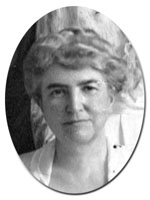
|
Although Martha Van Rensselaer (1864 - 1932) grew up
in modest circumstances in Randolph, New York, her mother's
active involvement in the suffrage
and temperance movements convinced her that women could effect
change in American life. After completing her high school education,
Van Rensselaer held a variety of teaching positions before she
was elected school commissioner of Cattaraugus County, New York,
a position usually held by men, which she held from 1893 until
1899. In this role, Van Rensselaer was introduced to Cornell's
small agricultural extension program, designed to educate farmers
in the latest scientific advances. Although she supported the
program's aims, Van Rensselaer recognized that there was no
equivalent instruction for the farm wife.
In 1900, Liberty Hyde Bailey invited Van Rensselaer to organize
an extension program for New York State's rural women. Under
Van Rensselaer's leadership, the fledgling extension program
blossomed. She believed that only by adopting new scientific
strategies to their daily tasks could women ease the burdens
of daily tasks involved in farm life. In less than five years,
the program enrolled more than 20,000 women members across New
York State.
Due to the success of female extension work, in l908 Cornell
decided to offer full-time home economics courses. Van Rensselaer
and Flora Rose were invited to
head the fledgling Department of Home Economics. Van Rensselaer
and Rose acted as a team: Rose's sophisticated scientific background
in nutrition gave the department academic credibility; Van Rensselaer's
hands-on experience, creative vision, and capable leadership
allowed the department to experiment, expand the scope of its
curriculum, and make linkages to others in the new profession.
From l914 to l916, Van Rensselaer served as president of the
American Home Economics Association. In 1919, her duties expanded
when the Cornell trustees authorized the establishment of a
School of Home Economics. Van Rensselaer and Rose were not only
professional partners: they lived together as companions until
Martha's death in 1932. One colleague even wrote to them as
"Miss Van Rose."
Van Rensselaer was regarded as a leading authority on issues
affecting women and families, and she used mass media to disseminate
her views. In 1919, with Flora Rose and Helen
Canon, she co-wrote A Manual of Home Making, a
widely read text on home management. From 1920 to 1926, she
was the home economics editor of the Delineator, a
popular women's magazine that reached over two million readers.
Van Rensselaer also wrote regularly for the Ladies Home
Journal, Children's Magazine, and Boys and Girls.
Van Rensselaer played a prominent national role in setting
social policy that affected families and children. During World
War I, she directed the Home Conservation Division of the United
States Food Administration. She also participated in the 1930
White House Conference on Child Health and Protection, which
set a critical Progressive Era agenda for youth health, social
policy, and education. There Van Rensselaer was instrumental
in drafting the Children's Charter, a national declaration on
child rearing. In 1931, she participated in the President's
Conference on Home Building and Home Ownership, which advocated
moving poverty-stricken urban workers out of the cities into
smaller, allegedly healthier rural communities. As a result
of her significant national contributions, in 1923 the League
of Women Voters recognized her as one of the twelve most
important women in America.
|



